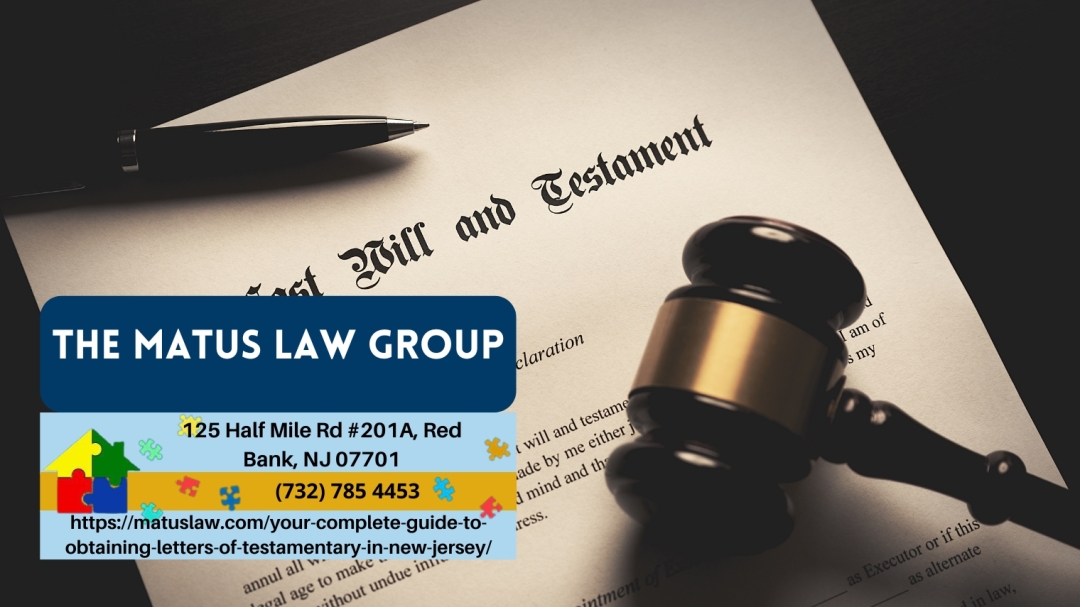Navigating the probate process can be challenging, particularly for those handling a loved one’s estate. Christine Matus (https://matuslaw.com/your-complete-guide-to-obtaining-letters-of-testamentary-in-new-jersey/), a New Jersey estate planning attorney, provides a comprehensive guide on obtaining Letters of Testamentary in New Jersey. These legal documents grant an executor the authority to manage a deceased person’s assets, ensuring the proper administration of the estate.
Christine Matus highlights that Letters of Testamentary in New Jersey are essential for executors seeking to access financial accounts, transfer property, and settle outstanding debts. Without these documents, financial institutions may refuse to recognize the executor’s authority, delaying the probate process. A New Jersey estate planning attorney can assist executors in understanding the necessary legal steps to ensure a smooth transition of assets.
For those unfamiliar with probate, New Jersey estate planning attorney Christine Matus outlines the initial steps required after a loved one’s passing. Securing the death certificate, locating the will, and identifying estate assets are crucial. In New Jersey, a valid will must be in writing, signed by the testator, and witnessed by at least two individuals. If these conditions are met, the executor can petition the Surrogate’s Court for Letters of Testamentary. If no will exists, the estate is subject to intestate succession laws, and the court appoints an administrator instead.
The probate process in New Jersey begins when the executor files a probate application with the county Surrogate’s Court. Christine Matus explains that this application must include the original will, a certified death certificate, and required affidavits. Upon approval, the court issues Letters of Testamentary, formally granting the executor authority to manage the estate. For small estates valued under $50,000 for a surviving spouse or $20,000 for other heirs, a simplified probate process may be available. However, for larger or contested estates, additional legal steps may be required.
Christine Matus emphasizes the critical role of the Surrogate’s Court in overseeing the probate process. To obtain Letters of Testamentary, the executor must submit essential documents, which the court reviews to confirm the validity of the will. In some cases, the court may require the executor to obtain a fiduciary bond as a safeguard for beneficiaries. If no valid will exists, Letters of Testamentary cannot be issued, and instead, the court appoints an administrator through Letters of Administration.
Once Letters of Testamentary are granted, Christine Matus explains that the executor assumes several key responsibilities. These include collecting and managing assets, notifying beneficiaries and creditors, paying debts and taxes, and distributing assets according to the will. The executor must also maintain accurate financial records and comply with probate laws. If disputes arise, such as a will contest or disagreements among heirs, the process may take longer and require court intervention.
Christine Matus clarifies that in New Jersey, obtaining Letters of Testamentary always requires probate. "The Surrogate’s Court must validate the will before issuing Letters of Testamentary, allowing the executor to access assets, pay debts, and distribute property according to the deceased’s wishes," she states. Executors may encounter challenges if financial institutions, real estate agencies, or other entities refuse to recognize their authority without these court-issued documents.
In some cases, probate may not be necessary. Christine Matus notes that estates consisting entirely of non-probate assets, such as life insurance policies with named beneficiaries or joint accounts with survivorship rights, may avoid the probate process. Additionally, small estates under certain financial thresholds may qualify for a simplified affidavit process, though this does not result in the issuance of Letters of Testamentary.
Christine Matus also explains the process for obtaining Letters of Testamentary. Executors must file the original will, a certified death certificate, and a probate application with the county Surrogate’s Court. If the will meets all legal requirements and no disputes arise, the court typically issues Letters of Testamentary within 10 to 15 business days. However, delays may occur due to will contests, missing paperwork, or difficulties locating heirs.
The cost of obtaining Letters of Testamentary varies by county. Christine Matus outlines potential expenses, including court filing fees, attorney fees, accounting fees, and fiduciary bond costs. Executors may need legal assistance, particularly in cases involving large estates, disputes, or tax obligations.
Christine Matus underscores the importance of estate planning to simplify probate and minimize legal complications. Executors must act in the best interests of the estate and beneficiaries, following New Jersey probate laws. Proper planning, record-keeping, and legal guidance can help avoid unnecessary delays and financial burdens.
For those managing an estate in New Jersey, Christine Matus and The Matus Law Group provide legal guidance on probate and estate administration. Executors and beneficiaries seeking assistance with estate planning and probate matters can reach out for comprehensive legal support.
About The Matus Law Group
The Matus Law Group is dedicated to helping families navigate estate planning and probate matters. With over 20 years of experience, the firm provides legal services tailored to estate administration, wills, trusts, and asset protection. Christine Matus and her team are committed to assisting executors and beneficiaries with personalized legal solutions.
Embeds:
Youtube Video: https://www.youtube.com/watch?v=1lBeRLkrr6k
GMB: https://www.google.com/maps?cid=3241702663730814860
Email and website
Email: admin@matuslaw.com
Website: https://matuslaw.com/monmouth-county-nj/
Media Contact
Company Name: The Matus Law Group
Contact Person: Christine Matus
Email: Send Email
Phone: (732) 785-4453
Address:125 Half Mile Rd #201A
City: Red Bank
State: New Jersey 07701
Country: United States
Website: https://matuslaw.com/

